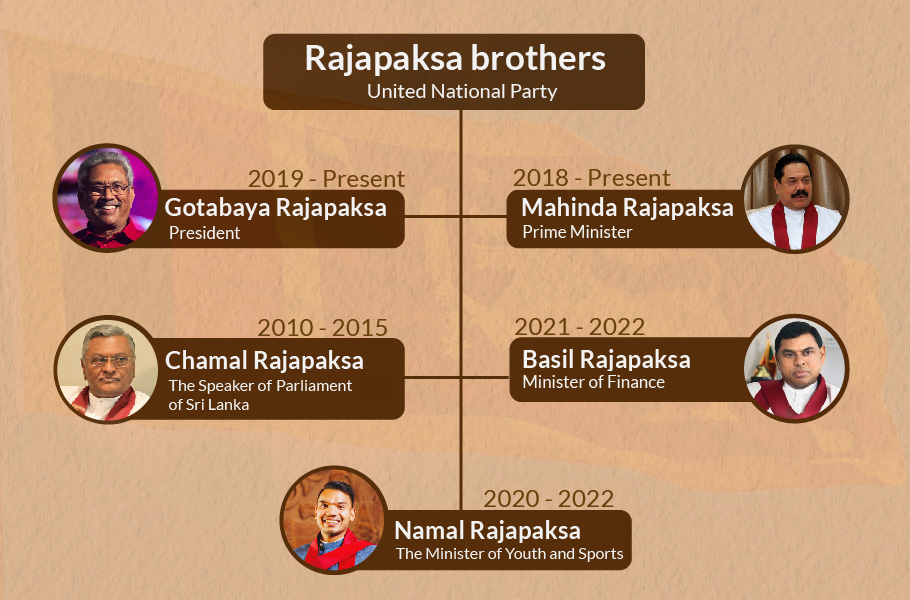
Rajapaksa brothers: Playing musical chairs in Lankan politics
The powerful Rajapaksa clan has been dominating Lankan political scene for at least two decades despite various corruption and human rights allegations against them

The Sri Lankan economic crisis has plunged the country into turmoil. Widespread protests have pushed the Rajapaksa government into a corner. Fiscal mismanagement has resulted in unprecedented fuel, food, medicines and power shortage and the people’s ire is directed towards the powerful Rajapaksa family, whose members occupied major positions in the government.
Gotabaya Rajapaksa is the President, his elder brother Mahinda Rajapaksa, former President, is the Prime Minister, younger brother Basil Rajapaksa was till a few days ago the finance minister and the eldest, Chamal Rajapaksa, a former speaker, was the irrigation minister. Their father DA Rajapaksa was a prominent politician in the island’s Hambantota region.
Mahinda, the driving force
The driving force behind this domination of the Rajapaksa clan in Lankan politics is the present Prime Minister and former two-time President Mahinda Rajapaksa. A lawyer by profession, Mahinda served as the President of Sri Lanka for two consecutive terms from 2005 to 2015. It was during his reign that LTTE leader V Prabhakaran was killed (in 2009) and war for Tamil Eelam ended. This made him a mascot for Sinhalese-Buddhist majority in the country. He, thus, was the one who raised the family’s status domestically as well internationally.
But, during his presidency, Mahinda faced many allegations — curbing judicial and press freedoms and favouring his own community, the Sinhalese, over the Tamil minority. He lost power to M Sirisena in 2015. In a twist of fate, Sirisena, finding it difficult to govern, made Mahinda his Prime Minister in 2018. The Supreme Court though overturned his appointment and he had to resign in eight weeks from the post. He had served as Prime Minister earlier also for a little over a year from 2004 to 2005. He also was leader of the opposition from 2002 to 2004 and 2018 to 2019, and as finance minister from 2005 to 2015 and 2019 to 2021.
In 2019, Rajapaksas stormed back to power. Only that instead of Mahinda, his younger brother Gotabaya became the President. A two-term cap on Presidency had barred Mahinda from contesting for the country’s highest office. Gotabaya though appointed Mahinda as the Prime Minister.
Gotabaya, soldier-turned-President
Gotabaya, currently the President, had joined the Sri Lankan Army in 1971. In 1998, he took early retirement and went to the United States only to return in 2005 following Mahinda’s victory in the 2005 presidential election. He became Secretary to the Ministry of Defence and in 2009, during his tenure, the Sri Lankan Armed Forces defeated the LTTE. After Mahinda’s defeat in 2015, Gotabya resigned. In 2019, he won the presidential election. He is the first person with a military background to be elected as President of Sri Lanka.
Gotabaya promoted himself as the “doer”, promising prosperity in the country. This made him popular among Sinhalese-Buddhist voters. Gotabaya, feared by the minorities, has been accused of human rights violations during and after the civil war, like running death squads targeting dissidents and journalists.
Basil, the next in line
After Mahinda and Gotabaya, Basil Rajapaksa is considered to be the next in line. The younger brother was the finance minister in the present government. He resigned with other members of the cabinet a couple of days back following economic unrest in the country. From 2005 to 2010, he was senior advisor to President Mahinda Rajapaksa.
Basil is credited for strengthening the Sri Lanka Podujana Peramuna (SLPP) party and one of the main forces behind Rajapaksa clan’s return to power in 2019. Basil commanded greater influence as a chief strategist, reports The Hindu. Basil too faces corruption charges and a 2007 US Embassy cable published by WikiLeaks called him “Mr Ten per cent”, citing commissions he allegedly took from government contracts, according to a Hindu report.
Chamal, the silent one
The eldest brother Chamal Rajapaksa is the least influential among the four. He was the Speaker of the Parliament from 2010 to 2015. He also served as the Minister of Ports and Aviation and the Minister of Irrigation and Water Management then. Before entering active politics in 1985, he had served in the Ceylon Police Force as a sub-inspector for eight years and the State Trading General Corporation as Assistant General Manager.


